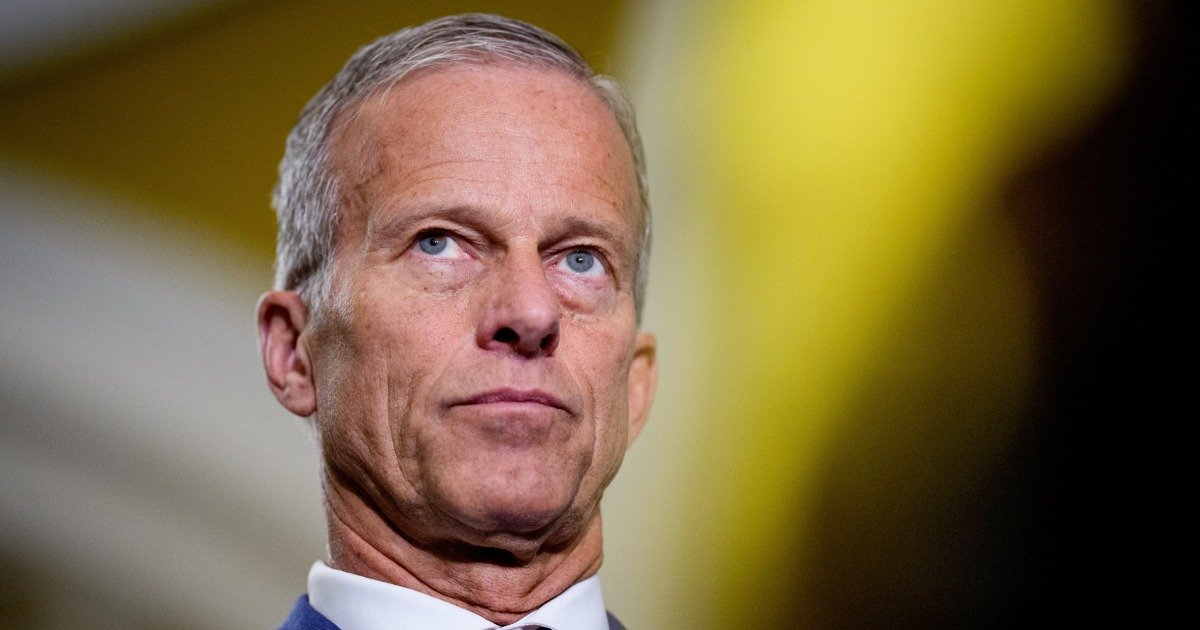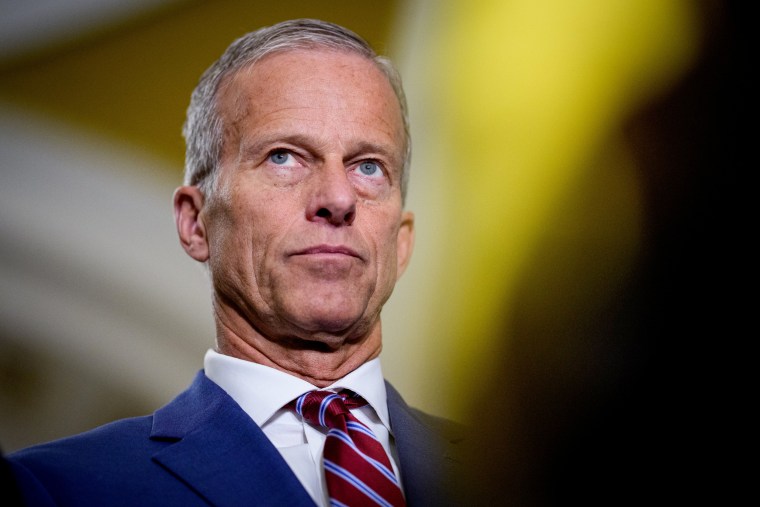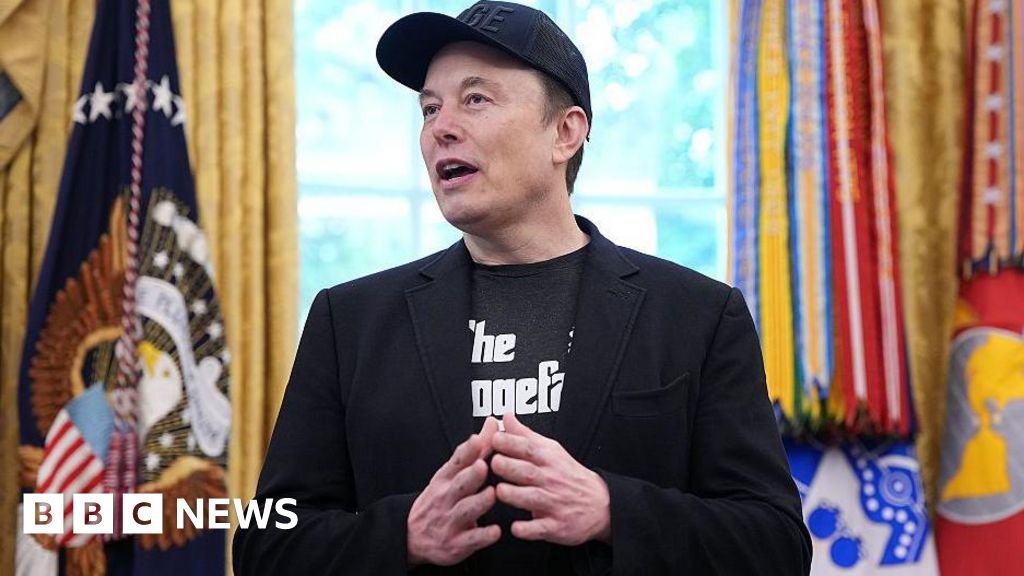Now Reading: Senate Republicans narrowly pass Trump megabill after marathon voting session
-
01
Senate Republicans narrowly pass Trump megabill after marathon voting session
Senate Republicans narrowly pass Trump megabill after marathon voting session

WASHINGTON — The Republican-controlled Senate narrowly passed President Donald Trump’s sweeping domestic policy package on Tuesday, bringing it one step closer to his desk.
The vote was 51-50, with Vice President JD Vance breaking a tie after three Republicans joined all Democrats in opposing the legislation.
It followed a marathon overnight session that spanned more than 24 hours, during which senators voted on dozens of proposed changes to the legislation and GOP leaders dragged out many of the votes as they frantically worked to win over holdouts. They ultimately secured enough votes with a catch-all amendment that was similarly approved by a vote of 51-50.
Sen. Lisa Murkowski, R-Alaska, who had expressed concerns throughout the process about the bill’s cuts to social safety net programs, was a key vote for Senate Majority Leader John Thune, R-S.D., to win over.
“I struggled mightily with the impact on the most vulnerable in this country, when you look to Medicaid and SNAP,” Murkowski told reporters after the vote, adding that she didn’t get “everything” she wanted but “I had to look on balance.”
Voting against the final bill, alongside all 47 Democrats, were Republican Sens. Rand Paul of Kentucky, Thom Tillis of North Carolina and Susan Collins of Maine. Paul opposed the bill because it would add trillions of dollars to the deficit, while Tillis and Collins feared the cuts to Medicaid were too steep.
“My difficulties with the bill go far beyond what they could resolve,” Collins said after casting her no vote.
Tuesday’s vote puts Trump on the cusp of a major legislative victory and hands Senate Majority Leader John Thune, R-S.D., the biggest win of his first six months on the job.

Dubbed by Trump as the “big, beautiful bill,” the revised legislation now heads back to the House, where Speaker Mike Johnson, R-La., will be forced to scramble to pass it before Trump’s July 4 deadline.
“The House will work quickly to pass the One Big Beautiful Bill that enacts President Trump’s full America First agenda by the Fourth of July,” Johnson and his leadership team said in a joint statement Tuesday. “The American people gave us a clear mandate, and after four years of Democrat failure, we intend to deliver without delay.”
Despite voting for the bill, Murkowski said she hopes the House makes changes to it.
“We do not have a perfect bill by any stretch of the imagination,” Murkowski said. “My hope is that House is going to look at this and recognize that we’re not there yet.”
Senate bill changes
Thune and his team made several 11th-hour changes to the bill to appease holdouts like Murkowski and get the package over the finish line. A special fund for rural hospitals, which faced cuts in the bill, was boosted to $50 billion, up from $25 billion. A provision banning solar leasing for clean energy tax credits was stripped out, as was an excise tax on wind and solar projects.
Conservatives’ aggressive push to slash federal funding for Medicaid expansion states ultimately did not make it in the final bill.
The bill contains an extension of Trump’s 2017 tax cuts and provisions to temporarily nix taxes on tips and overtime pay. It includes a surge of new funding for the military and to carry out Trump’s immigration enforcement and mass deportation plans. It aims to pay for some of that with hundreds of billions of dollars in cuts to Medicaid, the food-aid program known as SNAP, and clean energy funding. And it would raises the debt ceiling by $5 trillion.
To pass their bill, Republicans voted along party lines to set an aggressive new precedent that will have a lasting impact on the Senate. They used a trick known as “current policy baseline” to obscure the cost of extending 2017 tax cuts, essentially lowering the sticker price by $3.8 trillion. That tactic, backed by all 53 Republicans, hasn’t been used in the filibuster-proof process before and weakens the Senate’s 60-vote threshold.
“This is the nuclear option,” said Sen. Ron Wyden, D-Ore., while warning that it will “cut both ways” when the majority flips.
Ahead of the final revisions, the Senate bill was projected to increase the national debt by $3.3 trillion over a decade, according to the nonpartisan Congressional Budget Office, which said it would reduce revenues by $4.5 trillion and cut spending by $1.2 trillion. In addition, 11.8 million people are projected to lose their health insurance by 2034 if it becomes law, CBO said.
The Senate’s “vote-a-rama” session, in which members can offer an unlimited number of amendments to the legislation they are debating, dragged through the night into Tuesday morning. In total, senators cast votes on more than 45 amendments — a record.
One of the more notable was a lopsided 99-1 vote to kill a provision in the package — written by Sen. Ted Cruz, R-Texas, the chair of the Commerce Committee — to establish a 10-year moratorium on state and local artificial intelligence regulations. The vote came after GOP governors objected to the proposal and Sen. Marsha Blackburn, R-Tenn., backed out of a compromise deal with Cruz on a five-year temporary ban on the regulations.
Democrats, meanwhile, used the vote-a-rama to force a bevy of messaging votes to highlight how Republicans were protecting the super wealthy. They introduced four motions to let the 2017 tax cuts expire for people making $10 million, $100 million, $500 million and $1 billion a year, but each of those failed by voice vote.
“Americans will pay the price of this perfidy for generations,” Senate Minority Leader Chuck Schumer, D-N.Y., told reporters after Tuesday’s vote. “Republicans are taking away your health care to give a tax break to billionaires.”
Senators struggled to keep themselves occupied during the all-night session.
Republicans noshed on pizza in their cloakroom just off the floor. Sen. John Cornyn, R-Texas, read a book on his Kindle. Sen. Mike Lee, R-Utah, did a Trump impression to GOP colleagues as he discussed Elon Musk’s social media posts bashing the bill.
In the frigid chamber, Sen. Shelley Moore Capito, R-W.Va., wrapped herself in a blanket embroidered with the words, “Wild Wonderful West Virginia.” And Sen. Markwayne Mullin, R-Okla., recorded social media videos around the Capitol of things you won’t see on a normal tour.
Hurdles in the House
The legislation faces hurdles in the House, where Republicans can similarly only spare three votes. An earlier version of the bill passed by a one-vote margin, and the Senate changes have drawn criticism from some GOP lawmakers.
That includes the hard-right House Freedom Caucus, which is rebelling against the lack of spending cuts to pay for the bill. Rep. Nick LaLota, R-N.Y., came out against the scaled-back state and local tax (SALT) deduction cap in the bill; it increases the limit to $40,000 for five years, then cuts it back down to $10,000. And Rep. David Valadao, R-Calif., who represents a swing district, slammed the Senate bill’s more aggressive Medicaid funding cuts.
“I’ve been clear from the start that I will not support a final reconciliation bill that makes harmful cuts to Medicaid, puts critical funding at risk, or threatens the stability of healthcare providers across CA-22,” Valadao wrote on X over the weekend.
In a Truth Social post, Trump urged the House GOP to “ignores its occasional ‘GRANDSTANDERS’ (You know who you are!)” and pass the bill.
“To my GOP friends in the House: Stay UNITED, have fun, and Vote “YAY.” GOD BLESS YOU ALL!,” Trump wrote.

















































